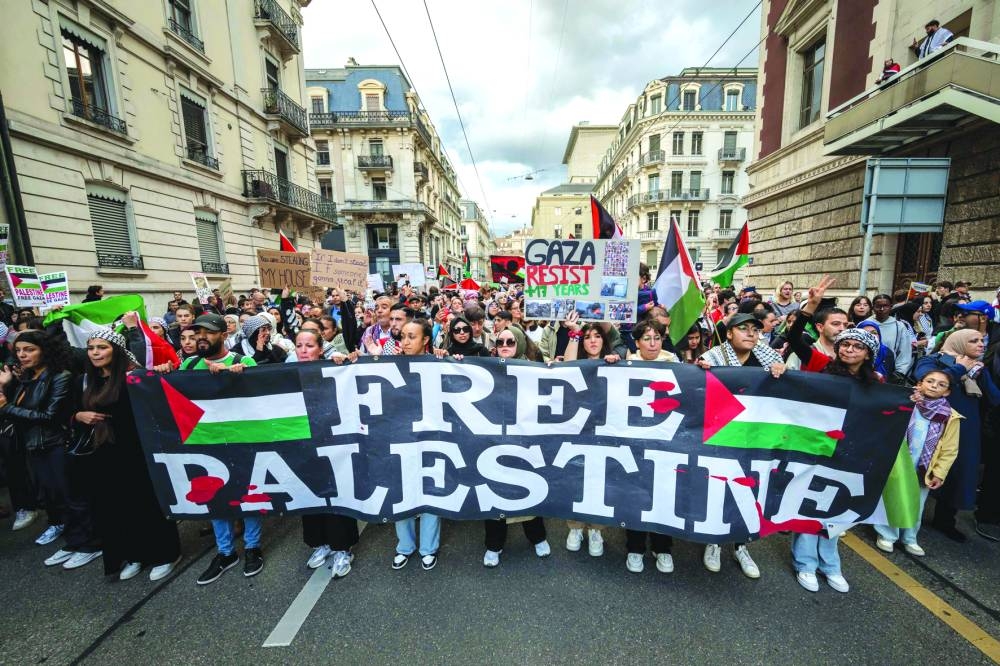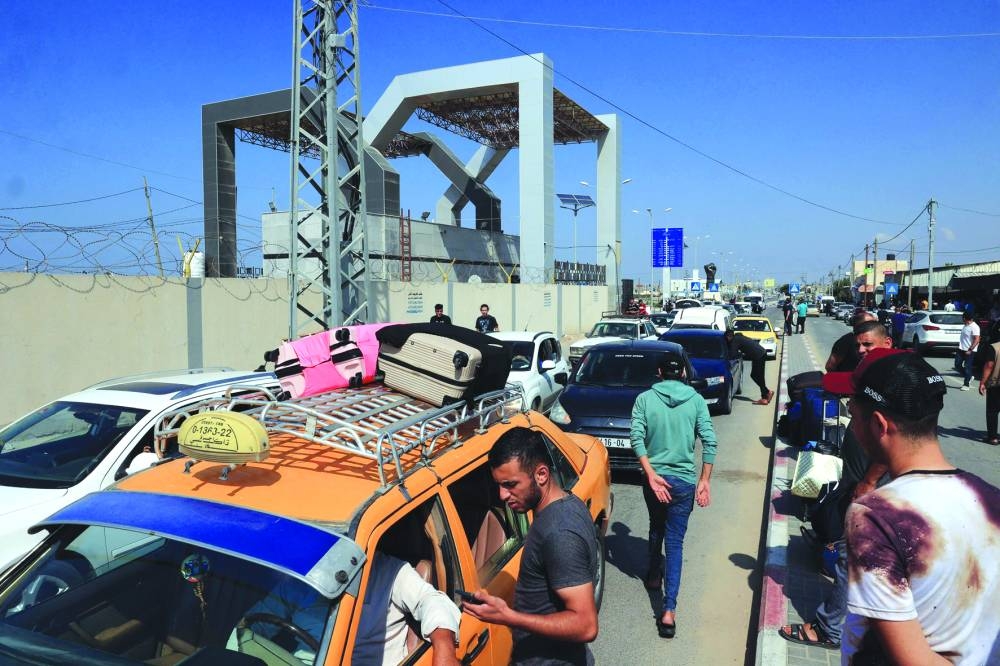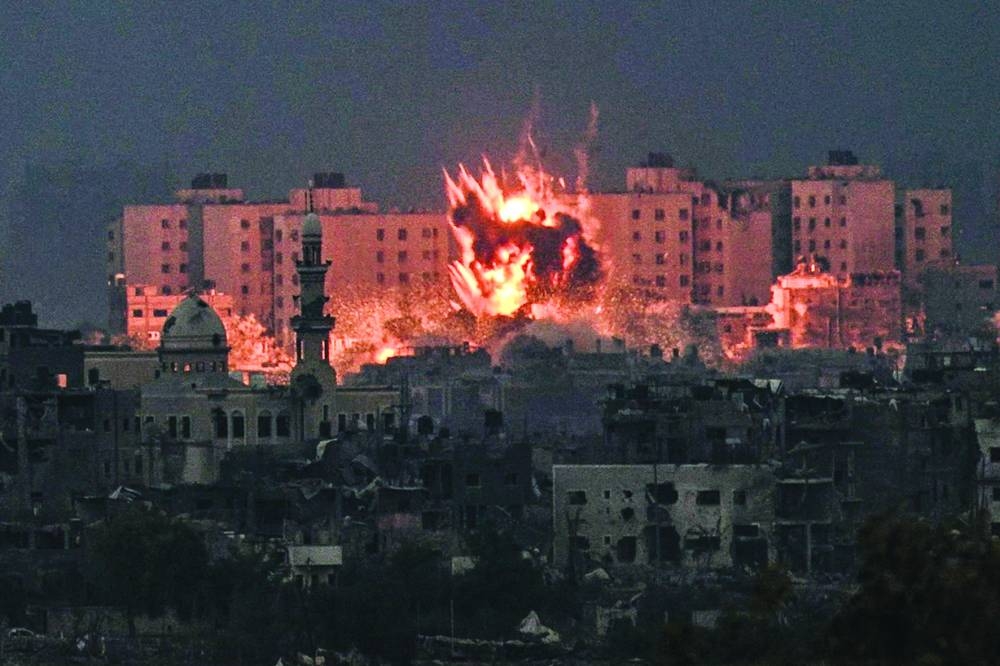Israel pummelled northern Gaza with fresh air strikes yesterday, one week on from the deadliest attack in its history, as it urged Palestinians to flee the area before an expected ground offensive against Hamas commanders.
AFP reporters near the southern Israeli city of Sderot saw troops fire at the densely populated enclave, sending huge plumes of black smoke into the sky.
Israeli Prime Minister Benjamin Netanyahu, wearing a flak jacket, meanwhile visited troops on the border frontline, raising expectations of an imminent invasion.
“Are you ready for what is coming? More is coming,” he is heard telling several soldiers on a video released by his office.
There has been no let-up in Israel’s response to the fighters’ dawn raid, which saw them break through the heavily fortified border and gun down, stab and burn to death more than 1,300 people.
On the Gazan side, health officials said more than 2,200 people had been killed. As on the Israeli side, most of them were civilians.
But with food, water, fuel and medical supplies running low because of an Israeli blockade, aid agencies are warning of an impending humanitarian crisis.
On the diplomatic front, Saudi Arabia pressed for an “immediate ceasefire”, while the US called on China to use its regional influence to push for calm.
MILITARY OPERATIONSIsrael, which has likened last week’s attacks to those on September 11, 2001 in the US, has fired thousands of missiles at northern Gaza.
One air strike killed Ali Qadi, described as “a company commander of the Hamas ‘Nakhba’ commando force” involved in the unprecedented attack, the army said.
Some 1.1mn people — nearly half the population of 2.4mn — live in the north of Gaza, and aid agencies have said forcing them to move is an impossibility as the war rages.
‘WAR CRIMES’
Exiled Hamas chief Ismail Haniyeh accused Israel yesterday of committing “war crimes” in Gaza and blocking the supply of much-needed aid.
In a letter to UN Secretary-General Antonio Guterres, posted on the group’s website, he called Israel’s cutting off of electricity, water and fuel supplies “barbaric”.
But he ruled out any “displacement” of Gazans, including to Egypt.
Israel has vowed to destroy Hamas. But it maintains that ordinary Palestinians are not their target.
Israeli military spokesman Richard Hecht urged civilians in northern Gaza not to delay in getting out, with a “window” for safe passage between 10:00am and 4:00pm.
He did not say how many days the window would remain open.
Gazans, who cannot leave the enclave as it is blockaded by both Israel and Egypt, have packed what belongings they can into bags and suitcases, to trudge through the rubble-strewn streets.
A stream of cars, trucks, three-wheeled vehicles and donkey-drawn carts joined the frantic mass movement south, all loaded with families and their belongings, mattresses, bedding and bags strapped onto the roofs of packed vehicles.
Roads in the 40-kilometre long territory were jammed. But putting distance between people and the bombings had not dispelled fear.
“We wake up to the killing and death under the bombs,” said Mohamed Abu Ali, who lives in Gaza.
“We don’t know where to go, where is safe. We have no food, water or electricity,” he added.
International aid agencies, including the UN and Red Cross, plus several foreign diplomats have voiced concern about the feasibility of the evacuation plan.
“We fear an unprecedented humanitarian catastrophe,” said Ivan Karakashian, of the Norwegian Refugee Council.
HOSPITALS OVERWHELMED
According to the UN, more than 1,300 buildings in Gaza have been destroyed, while local hospitals and their exhausted staff have become overwhelmed with growing numbers of dead and injured.
“What does the world want from us?” asked one Palestinian resident, Mohamed Khaled, 43. “I am a refugee in Gaza and they want to displace me yet again?” A potential Israeli ground invasion has also increased fears for the safety of the 150 hostages, including foreigners, that Israel said Hamas seized during its deadly rampage.
Hamas has threatened to kill the hostages one by one for every unannounced Israeli air strike.
A total of 22 have already been killed in bombardments, the group said, without elaborating.
Israel’s army says it has contacted the families of 120 civilians being held so far.
US President Joe Biden told US television on Friday that his administration was doing “everything” it could to locate 14 missing Americans.
Egypt and Israel have agreed to let US citizens leave the Gaza Strip through the Rafah crossing, a US official accompanying Secretary of State Antony Blinken on a regional tour told reporters.
But it was not immediately clear when the plan would be implemented.
REGIONAL CONCERN
The Hamas attack and the war it sparked — Gaza’s fifth in 15 years — have upended Middle Eastern politics, prompting fears that the violence will spread across the volatile region. Palestinian prime minister Mohamed Shtayyeh accused Israel of “genocide” in Gaza, while clashes in the occupied West Bank have killed 53 Palestinians in the past week.
Angry protests condemning Israel and supporting the Palestinians in Gaza took place across the Arab world on Friday.
More took place in New York on Friday night, and London on Saturday, where protesters waved Palestinian flags and placards with slogans such as “Freedom for Palestine” and “End the massacre”.
“I think all just people around the world, not just in Britain, must stand up and call for this madness (to end),” Ismail Patel, chairman of the Friends of Al-Aqsa campaign, said.
Israel faces the threat of a separate confrontation with Lebanon to the north, and artillery exchanges have taken place with the Hezbollah group in recent days.
On Friday, a Reuters video journalist was killed and six other reporters, from AFP, Reuters and Al-Jazeera, were wounded in shelling that Lebanon blamed on Israeli forces. Two Lebanese civilians were killed in Israeli shelling of a southern village on Saturday, its mayor told AFP.
Blinken, who has told Israel of Washington’s full support for its fightback, on Saturday said he had a “productive” one-hour phone call with his Chinese counterpart Wang Yi.
He is seeking Beijing’s help in restoring calm, State Department spokesman Matthew Miller told reporters.
In Beijing, Wang said China wanted urgent peace talks to resolve the situation, a read-out from the foreign ministry said.
Iran insists it was not involved.
Saudi Arabia, which has been seeking closer ties with Israel, has put “possible normalisation” talks on hold, a source familiar with the discussions said.
After a meeting with Blinken, Riyadh said it was calling for “an immediate ceasefire in Gaza” and the surrounding area, and for the siege to be lifted, to allow aid to get in.

Protesters hold a banner reading “Free Palestine” during a rally in support of Palestinians in Geneva, Switzerland, yesterday.

Palestinians with foreign passports arrive at the Rafah gate hoping to cross into Egypt as Israel’s attacks on the Gaza Strip continued yesterday.

A fireball erupts during Israeli bombardment in the northern Gaza Strip, yesterday.
